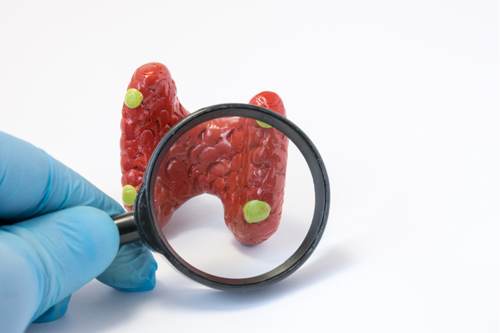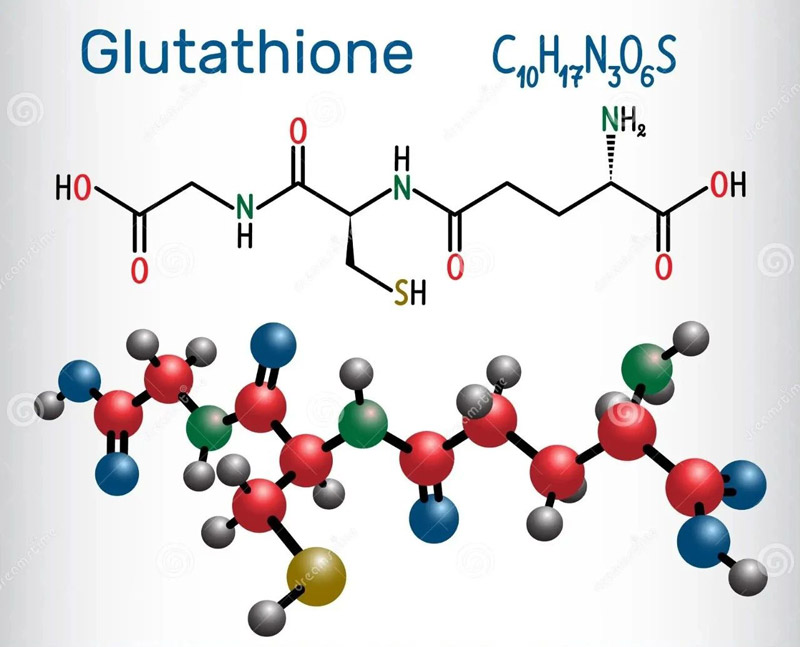When it comes to thyroid health, you may focus on iodine intake and hormone levels, but a powerful natural antioxidant in the body – Glutathione – is often overlooked.
More and more studies have shown that this “antioxidant master” plays a crucial role in maintaining thyroid function and resisting thyroid diseases.
How does glutathione protect thyroid gland?
1. Combat oxidative stress and protect thyroid cells
The thyroid gland is one of the most metabolically active organs in the human body, and the production of reactive oxygen species (ROS) is a by-product of normal metabolism.
Excessive ROS can lead to oxidative stress and directly damage thyroid follicular cells.
Glutathione, as the most important endogenous antioxidant in the body, can efficiently neutralize ROS, eliminate harmful free radicals, protect thyroid cell membranes and organelles (such as mitochondria) from oxidative damage, and maintain the integrity and function of cells.
This is crucial for preventing premature aging and functional disorders of thyroid cells.
2. Reduce inflammatory responses and relieve thyroiditis
The core pathological process of autoimmune thyroid diseases (such as Hashimoto’s thyroiditis and Graves’ disease) is chronic inflammation.
Oxidative stress and inflammatory responses are mutually causal, forming a vicious cycle.
Glutathione not only has direct antioxidant properties, but also has the functions of regulating immunity and inhibiting inflammation.

It can inhibit the production of pro-inflammatory cytokines, reduce the inflammatory infiltration of thyroid tissue, and thereby help alleviate the damage caused by autoimmune attacks to the thyroid.
3. Supports detoxification function to reduce impact of environmental toxins
Environmental pollutants (such as heavy metals, persistent organic pollutants (POPs)), certain drugs and even toxins in the diet may interfere with the synthesis or action of thyroid hormones, or induce autoimmune reactions.
Glutathione is a core participant in the detoxification process of organs such as the liver.
Its thiol group (-SH) can combine with heavy metals (such as mercury and lead) and various electrophilic toxins, converting them into water-soluble substances for excretion from the body and reducing the potential toxic effects of these toxins on the thyroid gland.
4. A stable environment that promotes hormone synthesis and metabolism
The synthesis of thyroid hormones (requiring iodine and tyrosine) and their activation (the conversion of T4 to the more active T3) is a delicate biochemical process that demands a suitable environment.
Glutathione provides the necessary stable environment for these key enzymatic reactions by maintaining the REDOX balance within cells.
The liver is the main site for the conversion of T4 to T3. The protective effect of glutathione on liver health indirectly promotes the normal metabolism and utilization of thyroid hormones.
association between glutathione and thyroid diseases
1. Thyroid nodules
There are clinical cases where glutathione has been used as an adjunct to the treatment of thyroid nodules. The mechanism may be related to its antioxidant and anti-inflammatory effects, aiming to alleviate oxidative stress and inflammatory conditions at the nodule site.
2. Autoimmune thyroiditis
Multiple studies have found that the levels of glutathione in lymphocytes and thyroid tissues of patients with Hashimoto’s thyroiditis are significantly reduced.
Supplementing glutathione or attempting to increase endogenous glutathione levels has been explored as an auxiliary strategy to alleviate thyroid autoimmune responses.
3. Abnormal thyroid function
Severe oxidative stress may lead to thyroid dysfunction.
Adequate levels of glutathione help maintain the stability of thyroid function, but large-scale clinical studies directly targeting hyperthyroidism/hypothyroidism are still ongoing.
liver is a “key ally” of glutathione in protecting thyroid gland
Thyroid hormone (T4) is mainly converted into its active form (T3) in the liver, and liver health directly affects the functioning of the thyroid gland.
Glutathione is the most crucial antioxidant and detoxifier in the liver.
- Protect liver cells: Resist damage to liver cells caused by toxins, drugs, alcohol, etc., and promote liver cell repair.
- Enhance detoxification function: Ensure that the toxins entering the circulation are reduced, indirectly protecting the thyroid gland from secondary damage.
- Promote the conversion of T4 to T3: Provide a favorable working environment for the key deiodinase.

It can said that maintaining the fullness of the liver’s glutathione reservoir is a key link in ensuring the effective utilization of thyroid hormones.
How to increase the level of glutathione?
1. Precursors of dietary supplements:
Foods rich in sulfur-containing amino acids: Glutathione is composed of glutamic acid, cysteine and glycine.
Supplementing foods rich in cystine/cysteine is key: lean meats (poultry, fish), eggs, dairy products, whole grains, legumes (especially soy products), garlic, Onions, broccoli, cabbage, kale and other cruciferous vegetables.
Foods rich in selenium and vitamins: Selenium is an essential component of glutathione peroxidase (GPx), an enzyme that relies on glutathione to exert its antioxidant effect.
Foods rich in selenium include nuts, seafood, offal, etc.
Vitamins C, E and B complex (especially B6, B12 and folic acid) also involved in the regeneration cycle of glutathione. Eat more fresh fruits, vegetables, nuts and seeds.

2. Lifestyle intervention:
Adequate sleep: The body repairs and produces glutathione during deep sleep.
Regular exercise (moderate) : Moderate-intensity exercise can enhance the body’s antioxidant capacity, but excessive exercise actually increases oxidative stress.
Stress reduction: Long-term stress depletes GSH. Stress-relieving techniques such as meditation, yoga and deep breathing are beneficial.
Avoid exposure to toxins: Reduce smoking (second-hand smoke), excessive alcohol consumption, exposure to pesticides and heavy metals, etc.
3. Glutathione Supplements
Glutathione precursors: Commonly used GSH precursors such as S-allyl-L-cysteine (SAC) and N-acetylcysteine (NAC) can significantly increase intracellular glutathione levels.
Alpha-lipoic acid (ALA) :
A powerful antioxidant that can help regenerate GSH and other antioxidants such as vitamin C and Vitamin E.
Whey protein (undenatured) : A high-quality bioavailable source of cystine.
Supplementing glutathione: You can choose to take glutathione supplements directly. (Such as GSH-rich yeast)
Glutathione is an indispensable defense cornerstone for thyroid cells to resist oxidative damage, calm the inflammatory storm and maintain normal functions.
Its close connection with liver health further consolidates its core position in the overall health of the thyroid.
Although enhancing one’s own reserves through diet and lifestyle is fundamental, supplementary intervention under specific health issues,
especially thyroid-related inflammation or severe oxidative stress, may become a powerful auxiliary means to maintain thyroid health.



